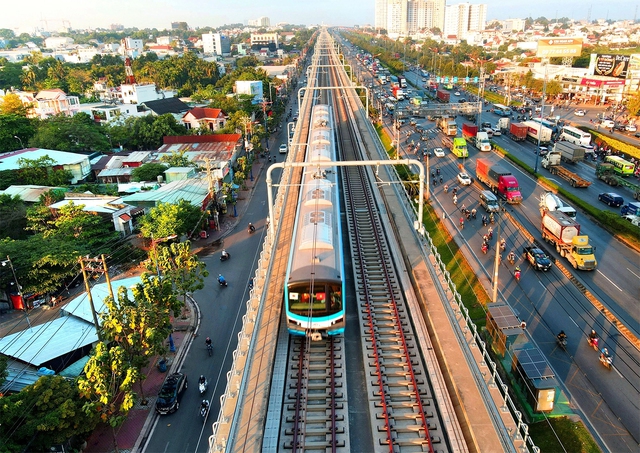HCMC targets to have three metro lines before 2030
VGP - Ho Chi Minh City (HCMC) is deploying a series of measures to ensure the completion of three key metro lines before 2030, an official said at a press briefing on the city’s socio-economic situation on November 20.

Deputy Head of the Planning and Investment Division under the Department of Construction Mai Thanh Tung noted that Southern metropolis is concurrently pushing forward several major urban and national railway projects.
For Metro Line No. 2, the Ben Thanh–Tham Luong line is finalizing project-adjustment procedures and is expected to begin construction in January 2026.
Meanwhile, the Ben Thanh–Thu Thiem line is undergoing study for the 2025–2030 period.
As for the Thu Thiem–Long Thanh line, the final pre-feasibility report has been completed, and HCMC has been assigned as the lead agency. The city is also coordinating with neighboring Dong Nai province to complete the required procedures, given that the route spans both localities.
With both central and local budgets under strain, the city considers mobilizing private investment a crucial solution, in line with the Politburo's Resolution No. 68 on developing the private economic sector. Several enterprises have expressed interest, including Thaco Group, which has proposed investing in the Ben Thanh–Thu Thiem and Thu Thiem–Long Thanh routes under a public–private partnership (PPP) model. The municipal administration has tasked specialized agencies with evaluating the proposal.
Mai said delays to Metro Line No. 1 resulted from conditions linked to ODA loans, the impacts of the COVID-19 pandemic, and the complexities of adopting metro technology for the first time. Drawing from these lessons, the city has now put in place special mechanisms to enhance autonomy in project approval and management.
The National Assembly has approved Resolution 188/2025/QH15, which pilots special policies for developing the urban railway networks in Ha Noi and HCMC. The resolution allows the application of breakthrough measures such as contractor appointment and expanded authority for the municipal People's Committee to approve projects and adjust designs and total investment.
HCMC has issued an implementation plan for Resolution 188/2025/QH15, along with a detailed plan specifically for the Ben Thanh–Tham Luong line. The Department of Construction is also working with interested investors to provide consultations within its jurisdiction.
Mai acknowledged that simultaneously implementing three major metro lines will create substantial pressure regarding timelines, financing, and coordination across sectors and provinces. Nevertheless, the special mechanisms under Resolution 188/2025/QH15 and the 2025 Railway Law are expected to help shorten investment-preparation phases, accelerate contractor selection, and remove procedural bottlenecks.
He added that the city is also developing frameworks to attract investment through PPPs combined with land-value capture and transit-oriented development (TOD) around stations, thereby encouraging greater private-sector participation.
Earlier, HCMC plans to start construction on its Metro Line No. 2 in January 2026 in a bid to ease chronic congestion by accelerating long-delayed upgrades to its strained urban transport network. The Ben Thanh–Tham Luong line, estimated to cost VND47.8 trillion (US$1.8 billion), is expected to take nearly five years to build and enter service around 2030. The project will be financed by both the central government and the city, which plans to spend about VND10 trillion a year on the line./.

